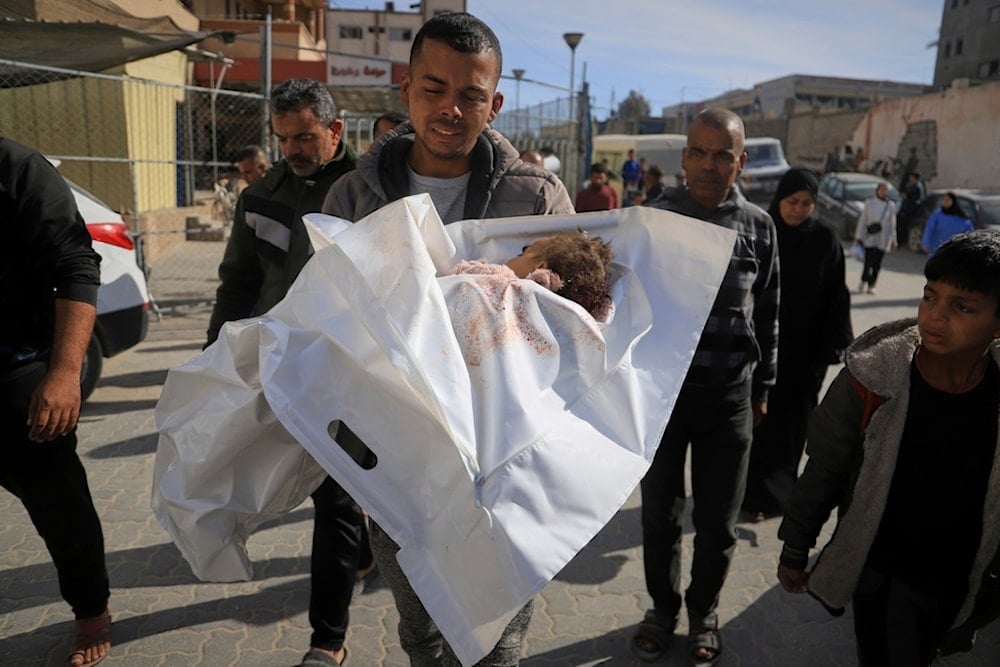Gaza faces total humanitarian collapse amid escalating Israeli attacks
The Gaza Strip has entered a phase of total humanitarian collapse, with severe food shortages, failing hospitals, and inoperative bakeries and water facilities.
-

A man carries the body of his niece Ahlam Seiam, who was just days away from her first birthday, into Nasser Hospital, after their home was hit by an overnight Israeli airstrike in Khan Younis, southern Gaza Strip, on Wednesday, April 16, 2025 (AP)
The Israeli occupation continues to carry out deadly attacks against civilians in the Gaza Strip, targeting residential buildings, makeshift shelters, and hospitals amid a crippling blockade. The ongoing strikes are resulting in a rising daily toll of fatalities and injuries.
According to the latest figures from the Palestinian Ministry of Health in Gaza, 25 people were confirmed killed and 89 others injured over the past 24 hours. Among the dead were three bodies recovered from the rubble. Many more victims remain trapped under debris or on inaccessible roads, where emergency and civil defense crews are unable to reach them.
Since March 18, 2025, Israeli attacks have claimed the lives of 1,652 people and injured 4,391. The cumulative death toll since the beginning of the military campaign on October 7, 2023, has reached 51,025, with 116,432 wounded.
Gaza on the brink of humanitarian collapse
The Gaza Strip has entered a phase of total humanitarian collapse, with severe food shortages, failing hospitals, and inoperative bakeries and water facilities. The threat of mass casualties due to starvation and disease looms large.
In a statement, the Government Media Office in Gaza warned that the humanitarian situation is now in a state of complete breakdown. It attributed this to a deliberate Israeli policy of blockade and starvation, noting that humanitarian aid has been entirely cut off for over six consecutive weeks.
The office described the current conditions as a full-blown humanitarian disaster. Hunger now threatens the lives of Gaza’s civilian population, particularly over 1.1 million children suffering from acute malnutrition. The population faces a dire lack of food, water, and medical services, with the basic necessities of life no longer available.
Starvation as a weapon of war
Long queues for food have become a daily reality in all provinces of Gaza. The Israeli occupation has deliberately targeted 37 aid distribution centers and 28 community kitchens, bombing and rendering them inoperable.
According to the Government Media Office, this reflects a systematic policy of using starvation as a method of warfare against civilians.
The office emphasized that the crisis in Gaza is not a temporary emergency but a calculated act of collective punishment. It described the situation as a war crime, carried out by Israeli forces with international complicity, particularly from countries like the United States, the United Kingdom, Germany, and France, which it accused of providing political and military cover for what it called a campaign of genocide.
Aid blockade deepens humanitarian suffering
Israeli authorities continue to prevent the entry of humanitarian aid and fuel into Gaza, despite thousands of relief trucks being stranded at border crossings for weeks. The blockade impacts every aspect of daily life and threatens the survival of more than 2.4 million Palestinians living in the Strip.
The Government Media Office noted that essential services are nearing total collapse. Hospitals are operating at minimal capacity, lacking both medication and fuel. Many could shut down completely within two weeks if fuel supplies are not restored.
Bakeries have already stopped functioning due to shortages of flour and energy sources, and water stations have ceased operation amid fuel depletion and power cuts, particularly affecting desalination facilities.
International community urged to act
As conditions deteriorate, the Government Media Office issued a stark warning of potential mass fatalities resulting from hunger, disease, and the collapse of healthcare services. It called for immediate international intervention to stop the Israeli acts of genocide and ethnic cleansing.
The office urged the global community to pressure Israeli authorities to lift the blockade, open crossings, and allow unrestricted humanitarian aid and fuel delivery, which is in line with international law and humanitarian principles. It concluded by stating that continued global silence on these crimes constitutes unacceptable complicity.

 4 Min Read
4 Min Read









